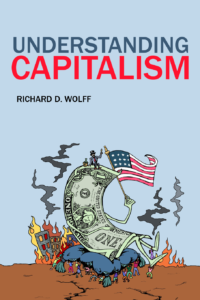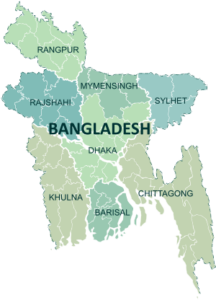Defeating The Fascists Is The First Order Of Business

C.J. Polychroniou
08-21-2024 ~ In the moral and political struggle to create a future with alternative possibilities, we need to build a united front. Radicalism can co-exist with pragmatic progressivism.
As we approach the 2024 presidential election, we are constantly told that this election is pivotal for the future of democracy. This may be so because a second Trump presidency would most likely be far more dangerous than the first. It would be foolish indeed not to take seriously when Trump says things like “We will root out the communists, Marxists, fascists and the radical left thugs that live like vermin within the confines of our country.” And we already know what he plans to do with the administrative state: demolish it and replace it with MAGA loyalists. As for his energy policies, ways to cut grocery and mortgage costs, and his strategy to deal with the climate crisis, they can all be summarized with one simple slogan: “Drill, baby, drill.” Consequently, it is imperative that we defeat Trump in November. But as Bernie Sanders said just last week, “it is not the only task for our progressive movement.”
Indeed, there are so many things that need to be done in the hope that we can end predatory plutocracy, lessen the inequities of 21st century capitalism, counter militarism, and reinvent U.S. democracy. On the first day of the National Democratic Convention, all the speakers highlighted with passion the need to defeat Trump in order to protect democracy and the interests of average people. Joe Biden himself told the crowd that democracy prevailed under his watch and now must be preserved.
However, as one would expect from a mainstream political party, the Harris-Walz campaign is not offering an alternative vision for the future, one that would recapture the true essence of democracy. There is a lot of rhetoric about “joy,” “freedom,” and “a better future,” but Harris’s economic plan mirrors many of Biden’s economic initiatives though in an expanded format, such as her ideas for addressing the housing crisis. Read more
The Status Of Europe’s Autonomous Movements

John P. Ruehl – Source: Independent Media Institute
08-20-2024 ~ While the EU plays a dominant role in managing autonomous and separatist movements in member states, non-EU countries have their own rules, and can be more vulnerable to outside interference.
Spanish officials reassuringly heralded a “new era” for the country after May 2024 elections. Catalonian pro-independence parties had lost the parliamentary majority that had enabled them to govern their region since 2015, and for the first time in decades, had failed to secure a majority of seats in regional parliament. Spain’s ruling Socialists meanwhile managed to emerge as Catalonia’s largest party.
Madrid’s political focus on Catalonia has intensified since 2017. After holding what was deemed by Spanish authorities an illegal independence referendum, Catalonia’s president and other officials fled to Belgium, prompting a diplomatic crisis. Spain then imposed direct rule over the region, with the EU backing the decision and citing the need for constitutional approval for referendums. In the aftermath, local support for Catalonia’s independence declined, offering Madrid a way in.
Spain’s separatist and autonomous movements are among Europe’s most well-known, and its management of them is watched closely across the continent. Many other European nations, particularly in larger countries, have autonomous movements seeking devolution, self-government, or outright independence. The perceived failure of the EU, international diplomacy, and integration efforts to resolve these issues has led countries to maintain their own policies. Although few movements are considered serious threats, attempts to assert themselves often provoke direct interventions by national governments—when these governments have the capacity to do so. Read more
Capitalism, Mass Anger, And 2024 Elections

Richard D. Wolff
08-14-2024 ~ In the wake of his huge defeat on June 30, 2024, when 80 percent of voters rejected French “centrist” President Emmanuel Macron, he said he understood the French people’s anger. In the UK, Conservative loser Rishi Sunak said the same about the British people’s anger, as Labor leader Starmer now says as the anger explodes. Of course, such phrases from such politicians usually mean little or nothing and accomplish less. Such leaders and their parties just keep calculating how best to regain power when they lose it. In that, they are like the U.S. Democrats after Biden’s performance in his debate with Trump and like the U.S. Republicans after Trump’s loss in 2020. In both parties, a small group of top leaders and top donors made all the key decisions and then organized the political theater to ratify those decisions. Even surprises like Harris replacing Biden are temporary departures from resuming politics as usual.
However, unlike Trump, the others missed opportunities to identify with an already organized mass base of angry people. Trump stumbled into that identification by saying loudly and crudely what traditional politicians treated as publicly unspeakable about immigrants, women, NATO, and traditional political taboos. That set the tone for Trump then doubling down by insisting he had won the 2020 election but had been cheated out of it. The mass anger of populations feeling victimized in their workaday lives found a spokesperson loudly claiming parallel victimizations. Trump and base grasped that together they might victimize their victimizers.
Whether or not they can politically exploit voters’ anger, no mainstream leader in the collective West, including Trump, seems actually to “understand” it. They mostly see only as far as what they can plausibly blame on their opponents in the next election. Biden blamed Trump for a “bad” economy in 2020, while Trump reversed the same blame over the last year and will shortly adjust to blaming Harris. Presidential opponents blame the other for the “immigration crisis,” for inadequately protecting U.S. industry from Chinese competition, government budget deficits, and job exports.
No mainstream leader “understands” (or dares to hint or suggest) that mass anger these days might be something more and different from any collection of specific complaints and demands (about guns, abortion, taxes, and wars). Even the demagogues who like to speak about “culture wars” dare not ask why such “wars” are hot now. Angry “Make America Great Again” (MAGA) folks are notably vague and poorly informed as their critics enjoy exposing. Rarely do those critics offer persuasive alternative explanations for MAGA anger (explanations that are neither vague nor poorly informed). Read more
A Note On Noam Chomsky And Climate Collapse

Noam Chomsky ~ Photo: en.wikipedia.org
08-13-2024 ~ As Noam once said, “if you assume there is no hope, you guarantee there will be no hope.”
In many of his recent writings, Noam Chomsky has warned that humanity has reached a very dangerous point because we are now living in a world of cascading crises. Indeed, when we look around us, we see a global web of crises. Economic inequality is destabilizing democracies and making a mockery of the vision of a decent society; armed conflicts continue to mark human existence; and nuclear weapons and global warming threaten humanity’s survival. Meanwhile, we must feel aghast over the fact that cynicism and irrationality continue to define the mindset of the powers that be. This is precisely the reason why Chomsky has always seen activism as our only hope.
What’s happening in Gaza is an abomination, one that the leaders of this world are watching coldly from a distance. The same can be said about climate collapse, which is as real as the daily slaughtering of scores of innocent women and children in Gaza by Israel’s military. Our global institutions are incapable of doing anything meaningful about these crises. Real power is in the hands of the most powerful nation-states and their leaders have opted to turn a blind eye to both disasters so as not to disrupt business as usual. Profits and geostrategic interests take priority over human lives and the environment. This is as clear as day, and it has always been so since at least the emergence of capitalism and the rise of the nation-state. Read more
Capitalism’s Unequal Distribution Deprives You Of True Freedom

ISBN Paperback: 978-1-7356013-6-6, eBook: 978-1-7356013-5-9
08-13-2024 ~ As the French economist Thomas Piketty most recently exposed, capitalism, across time and space, has always tended to produce ever-greater economic inequality. Oxfam, a global charity, reported that 2022’s 10 richest men together had six times more wealth than the poorest 3.1 billion people on earth. The lack of democracy inside workplaces or enterprises is both a cause and an effect of capitalism’s unequal distribution of income and wealth.
Of course, inequality predates capitalism. Powerful feudal lords across Europe had blended autocracy with unequal distributions of wealth on their manorial estates. In fact, the largest and most powerful among the lords—the one named king—was usually also the richest. Although revolts against monarchy eventually retired most kings and queens (one way or another), similarly rich dictators reemerged inside capitalist enterprises as major shareholders and CEOs. Nowadays, their palaces imitate the grandeur of kings’ castles. The fortunes of kings and top CEOs are similarly extreme and attract the same kind of envy, adulation, and reverence. They also draw the same criticism. Inequalities that marked the economy, politics, and culture of European feudalism reappeared in capitalism despite the intentions of many who revolted against feudalism. The problem: the employer/employee relationship is far less a break from the master/slave and lord/serf relations of production than capitalism’s champions had hoped for, assumed, and promised in order to secure mass support for their revolutions against slavery and feudalism.
The employer/employee relationship that defines capitalism has created staggering inequality by allowing the employer full control over production’s surplus. In the past, inequality provoked references to rich capitalists, variously, as “robber barons” or as “captains of industry” (depending on the public’s feelings about them). Today, they’re referred to as “the rich” or sometimes “the superrich.” Read more
The Conundrums Of Bangladeshi Politics

Bangladesh – Map: en.wikipedia.org
08-12-2024 ~ On Monday, August 5, former Prime Minister Sheikh Hasina boarded a Bangladesh Air Force C-130J military transport in a hurry and fled to Hindon Air Force base, outside Delhi. Her plane was refueled and reports said that she intended to fly on either to the United Kingdom (her niece, Tulip Siddiq is a minister in the new Labor government), Finland (her nephew Radwan Mujib Siddiq is married to a Finnish national), or the United States (her son Sajeeb Wajed Joy is a dual Bangladesh-US national).
Army Chief Waker uz-Zaman, who only became Army Chief six weeks ago and was her relative by marriage, informed her earlier in the day that he was taking charge of the situation and would create an interim government to hold future elections.
Sheikh Hasina was the longest-serving prime minister in Bangladesh’s history. She was the prime minister from 1996 to 2001, and then from 2009 to 2024—a total of 20 years. This was a sharp contrast to her father Sheikh Mujib, who was assassinated in 1975 after four years in power, or General Ziaur Rahman who was assassinated in 1981 after six years in power. In a scene reminiscent of the end of Mahinda Rajapaksa’s rule in Sri Lanka, jubilant crowds of thousands crashed the gates of Ganabhaban, the official residence of the prime minister, and jubilantly made off with everything they could find.
Tanzim Wahab, photographer and chief curator of the Bengal Foundation, told me, “When [the masses] storm into the palace and make off with pet swans, elliptical machines, and palatial red sofas, you can feel the level of subaltern class fury that built up against a rapacious regime.” There was widespread celebration across Bangladesh, along with bursts of attacks against buildings identified with the government—private TV channels, and palatial homes of government ministers were a favored target for arson. Several local-level leaders in Sheikh Hasina’s Awami League have already been killed (Mohsin Reza, a local president of the party, was beaten to death in Khulna). Read more
- Page 2 of 3
- previous page
- 1
- 2
- 3
- next page


